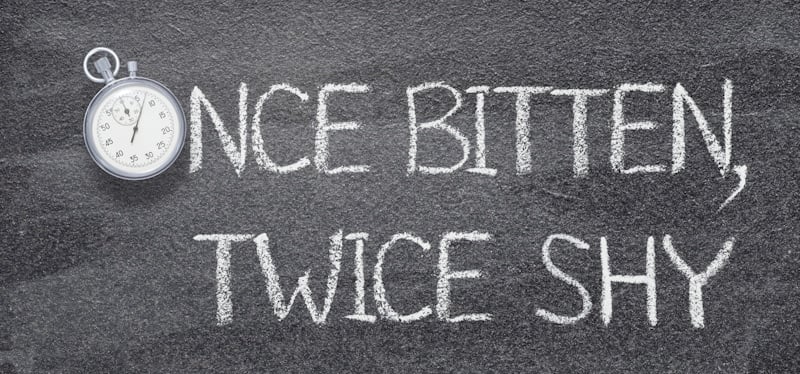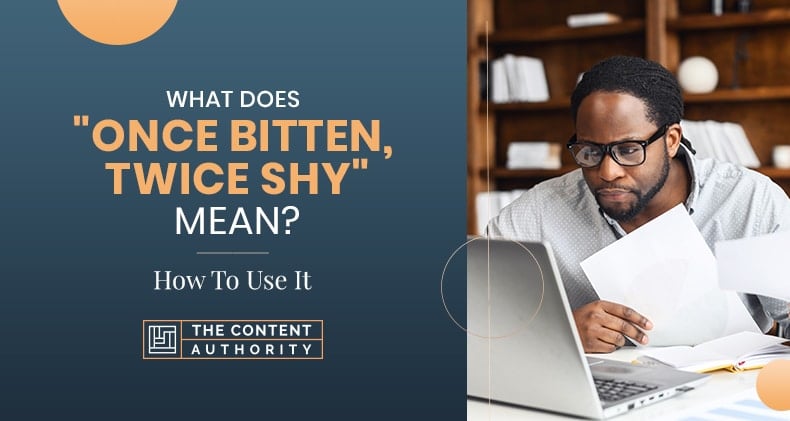With the number of proverbs in existence today, it can be challenging to keep up with them and what they all mean. One of the proverbs you may have heard of is the saying, “Once bitten, twice shy.” Did you really understand what the person was talking about when they said it?
When you hear someone say “Once bitten, twice shy” they’re telling you that a person who’s either failed or been hurt when they’ve tried to do something will be careful, possibly even fearful when it comes to doing it again. This is a common proverb that originated in the 18th century.
Meaning of the Proverb
You may expect someone to say “once bitten, twice shy” whenever someones been bitten by an insect or an animal. However, since this is an idiomatic expression, this isn’t what this proverb means. Instead, this is a phrase that’s intended to be taken figuratively, not literally. Of course, you can still actively imagine this saying in a literal way if you want to do so.
Think about playing tug of war with a dog who suddenly bites you. Are you going to be eager to play like this with him again? No. In fact, you probably won’t want to play with them like this again anytime soon.
Now take some time to think about someone or someone who’s hurt you either physically or emotionally. You’ll probably take extra care to avoid this person or the situation you were in the next time. In fact, you may avoid them or the situation for quite some time to come. This is exactly what this proverb is meant to express: You’re afraid to repeat an experience that’s either uncomfortable or unpleasant. Additionally, you don’t want to interact with the person who’s inflicted pain on you again.
While it can mean that you won’t ever repeat the scenario or see the person again, it doesn’t necessarily mean this. However, when someone says “once bitten, twice shy” they’re saying they’ll be very cautious when a similar situation arises or they have the opportunity to interact with this person again.
Essentially, there are a few different ways in which you can define this proverb, including:
- You’ll be careful when it comes to this situation in the future
- You may be unwilling to do something again once you’ve failed at or been hurt by a situation
- You’ve had an experience that’s been unpleasant and thus warrants caution
- You’re afraid to do something again because you’ve had an unfriendly experience with it
- Your first unpleasant experience with a situation has made it scary and more difficult to try to do it again

Synonyms
There are various words and phrases you can use instead of saying “once bitten, twice shy.” Doing so will allow you to express the same sentiment but in a different way. Some of the words that you’ll be able to replace this phrase with include:
- Alert (on alert)
- Careful
- Cautious
- Distrustful
- Eyes peeled
- Fearful
- Guarded
- Hesitant
- Measured
- Mindful
- On guard
- On one’s toes
- Prudent
- Risk-averse
- Suspicious
- Vigilant
- Wary
- Watchful
There are also some different ways in which you can say the phrase in its entirety. Some of the alternative forms you may use include:
- A beaten dog may cower before a friendly hand.
- A burnt child dreads the fire
- Bitten by a snake on one morning, afraid of the rope by the well for ten years.
- Once burned, twice cautious
- Once burned, twice shy
- Once hurt, twice shy

Origins of the Proverb
Nobody knows for sure where this proverb originated. Some people say that it originated because of a dog bit since once a dog bites you you’ll approach it with caution in the future. The first use of this phrase has also been attributed to Aesop’s Fables. Aesop was an ancient Greek storyteller who created a story about a dog and a wolf to explain a moral. This is something that in the 1400s was translated to English by William Claxton. In this proverb, we read, “He that hath been ones beguiled by some other ought to keep him well from the same.”
In this tale, there’s a wolf who’s about to eat a dog. The dog manages to convince the wolf that he’s skinny and needs to have some time to fatten himself up so he’d make a good meal for the wolf. The wolf agrees with the dog. However, when the wolf finally demands that the dog give himself up to be eaten the dog refuses to do so and keeps himself out of the wolf’s reach. The wolf grows upset with the dog and the dog proceeds to tell the wolf that he’ll never lay that close to the gate again. Nevertheless, the dog’s trick worked.
While this is a great moral, its translation doesn’t read in the exact same way as we use the phrase today. However, it is very similar in that it suggests once someone has let themselves be fooled once they won’t allow it to happen again.
It should be noted here that British English around the turn of the 19th century would often use the word “bite” to describe a bad experience. As such, this phrase was used in the figurative sense meaning that a person was being “let down.” This is why there are many similar expressions to this proverb that can be found throughout British literature including:
- “The History of Miss Betsy Thoughtless” by Eliza Fowler in 1751: “I have been bit once, and have made a vow never to settle upon any woman while I live, again.”
- “The Victim of Villany” by Lady Maclairn in 1806: “My wife says that the Captain is very fond of her, and if all be gold that glitters, I am to believe that he doats upon her; but once bit twice shy, is the maxim uppermost with me when the Captain is concerned.”
- “Mr. Sponge’s Sporting Tour” by Robert Smith Surtees in the 1850s included a near match.
- “A Collection of Chinese Proverbs” by William Scarborough in 1857: “Once bitten by a snake in passing by, a second time he will of grass be shy.”
The Phrase Gets a Pop-Culture Boost
There are a lot of people who know this expression because they’ve heard the song, “Once Bitten, Twice Shy” by Ian Hunder and the Great White band. This song came to great acclaim late in the 1980s. In the lyrics, we hear about a man who was hurt because he was in love with a woman who he couldn’t count. This is why the majority of this song’s catchy chorus consists of the idiom
“I said my, my, my, I’m once bitten twice, shy babe
My, my, my, I’m once bitten twice shy baby
My, my, my, I’m once bitten twice shy baby”

Example Sentences
With all the notoriety that this phrase has received since being included in a song in the 1980s, it’s become quite popular in everyday conversation. You may even want to start using it there yourself. Here are a few sentences so you can have some examples of how you can do so:
- Once my divorce is finalized I don’t think that I’ll ever get married again – once bitten, twice shy.
- The salesperson once bitten, twice shy, should never come here to knock on our door again. I made it quite clear to them that we didn’t need the product they were selling.
- That rollercoaster ride scared me so bad I don’t think I’ll ever ride one again. After all, you know what they say, “once bitten, twice shy.”
- It seems like it’s been a lifetime since I started acting. Once bitten, twice shy; I’m really not ready to try it again.
- Investors have an element of once bitten, twice shy when it comes to going back into something like equities.
- I wouldn’t have ever believed the pictures if I hadn’t seen them. Then I thought to myself, once bitten, twice shy.
- Not only is it true that once bitten, twice shy but his male ego is also telling him that he shouldn’t take another risk.
- The first time the Kerry champions visited Croke Park they played in such a conservative way that you could tell they were nervous competing against a team that had beat them before because once bitten, twice shy.
- It wasn’t a case of once bitten, twice shy.
- I hope our nation remains once bitten, twice shy.
- She took such a pragmatic approach. It enabled her to win over voters who may have m otherwise been once bitten, twice shy.
Conclusion
There are a lot of proverbs that have become commonplace in the English language today. For instance, since the 18th century “Once bitten, twice shy” has become a popular saying. The next time someone says this to you you’ll know that it means that because someone has tried and failed or been hurt by their attempt the person is careful (and maybe even a bit fearful) about doing it again.
Shawn Manaher is the founder and CEO of The Content Authority. He’s one part content manager, one part writing ninja organizer, and two parts leader of top content creators. You don’t even want to know what he calls pancakes.

